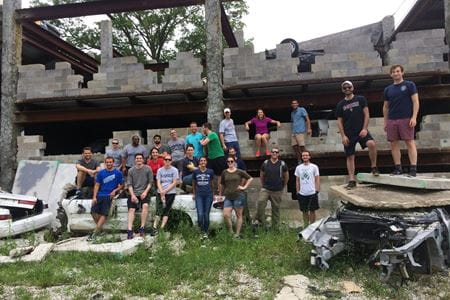First, it was Harvey, a category four hurricane causing devastation to millions of people in Texas and Louisiana. Now, it’s Irma, another catastrophic storm that has ripped through the Caribbean and is currently barreling through Florida and the southeastern coast of the United States.
Survivors of these natural disasters have a challenging road ahead – from coming to terms with significant loss and rebuilding their lives, to maintaining their health in a disaster-stricken area. That’s why the IU School of Medicine Department of Emergency Medicine is committed to the training of physicians to handle such care.
Jon Hemmert, MD, an emergency medicine physician at Ben Taub Hospital and Cypress Creek Emergency Room in Houston, and a 2011 graduate of the IU School of Medicine Emergency Medicine Residency Program, spent recent weeks in the thick of Hurricane Harvey and is now helping others to heal.
“When Harvey hit, several hospitals and urgent care sites had to close completely,” Dr. Hemmert said. “Many of the remaining hospitals were on ‘emergency surgery only’ status.”
Aside from a reduced number of clinical sites available to provide care, physicians found themselves dealing with another depletion: staff.
“Our physicians live on all sides of the city…most were unable to make it to our clinical sites because of the flooding,” Dr. Hemmert said. “The ED docs at Ben Taub were trapped for three days, rotating between taking call and sleeping in call rooms when they could. Others at our freestanding facilities worked 72-plus hours straight with no relief.”
Although responding to these types of disasters is never easy, Dr. Hemmert said he felt more prepared thanks to the training he received at IU School of Medicine.
Emergency medicine residents at IU School of Medicine are trained by exceptional faculty physicians to provide quality care under any given circumstance. Located in the heart of Indianapolis, residents receive unparalleled clinical exposure on the Indiana University Medical Center Campus.
“All emergency medicine physicians should be trained on how to handle any surge of patients,” said Josh Mugele, MD, assistant professor of emergency medicine and assistant program director for the school’s Emergency Medicine Residency Program. “Our residents are in the unique position to train at two of the busiest emergency departments in the country – IU Health Methodist Hospital and Eskenazi Health – caring for a very high volume of very sick patients every single day.”
In addition to high volume clinical experience, residents benefit from a disaster-specific curriculum that includes multiple courses for disaster planning, a series of tabletop exercises and drills to practice good decision-making and organizational skills, and an off-site training center specifically dedicated to disaster simulation.
“Every year, we take our residents to the Muscatatuck Urban Training Complex to simulate what it’s like to be a provider in a disaster-stricken area,” Dr. Mugele said. “Here, residents prove their ability to handle a large surge of patients while also dealing with limited resources. For example, the power may be out, or you may only have one ventilator for six critically ill patients – how do you decide which patient gets it? The scenarios are endless.”
Dr. Hemmert said the curriculum and clinical exposure at IU School of Medicine helped him maintain his composure and continue providing the best care possible during Hurricane Harvey.
“At the peak of the flooding, I was trapped in one of our freestanding emergency rooms for 48 hours straight,” he said. “I can honestly say that my training at IU made me feel comfortable knowing that there was a good chance something critical would come walking through those doors, and that it may be a long time before an ambulance or helicopter could take them back to wherever they needed to go. Despite the chaos, I felt confident and prepared…we saw it all at IU.”




